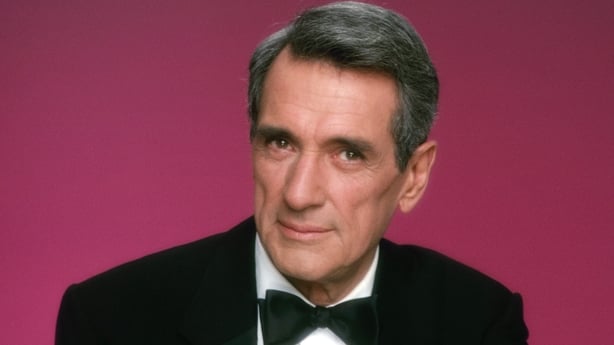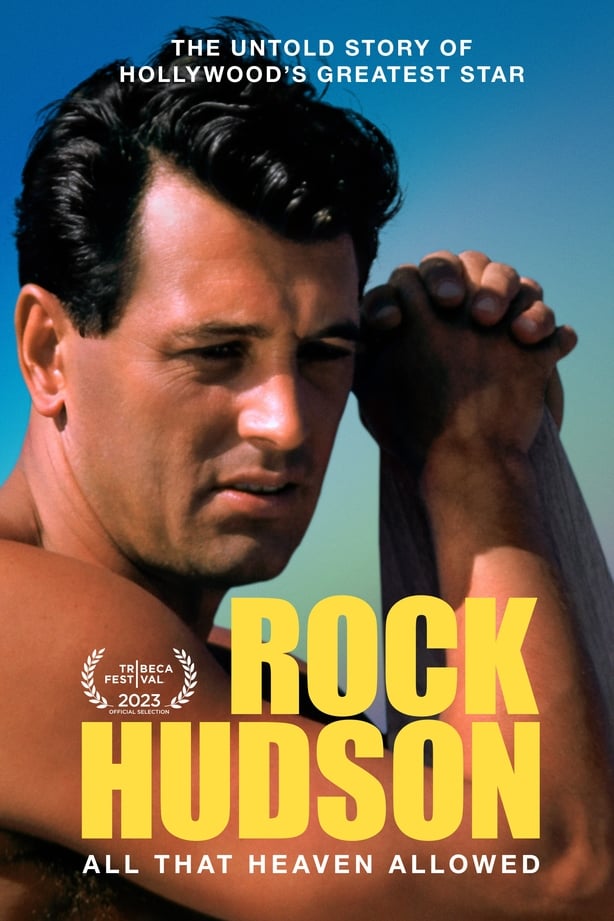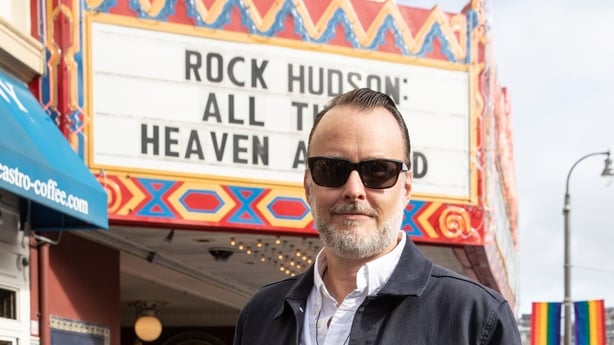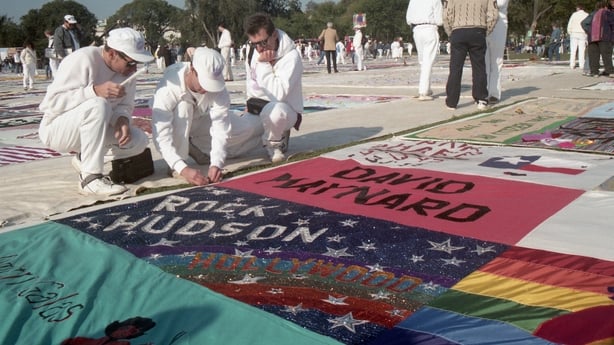"We had initially thought we'd call the film The Accidental Activist, which is definitely a part of the story, but I think it's a lot bigger than that. And there were a lot of actual activists who fought a lot harder and really put themselves on the line in the struggle against HIV and AIDS. But the Rock Hudson effect was undeniable and was very, very significant at the time."
So says director Stephen Kijak of his superb documentary Rock Hudson: All That Heaven Allowed. It's the story of how a self-proclaimed "midwestern hick" became one of Hollywood's biggest stars, hid his sexuality for the sake of his career and ultimately became the global face of the burgeoning HIV/AIDS crisis, passing away in October 1985 at the age of 59.
In the years since his death, Hudson's work has become a footnote for many to the story of his passing - but Kijak's film rights that wrong. The author Gabriel García Márquez famously said: "Everyone has three lives: a public life, a private life and a secret life." Rock Hudson: All That Heaven Allowed more than does justice to that quote, with as much for the generations too young to remember as the ones too old to forget.
Below, Stephen Kijak talks about making the film and its impact on him and viewers.
Harry Guerin: I was 13 years of age when Rock Hudson died. When I think back, I had never seen any of his films at the time - and yet I can still remember so vividly seeing the headlines that he had AIDS and hearing my parents talking about him being gravely ill. What are your own memories of that time? What age were you back then?
Stephen Kijak: Not much older. I believe I was about 14-15 years old. Similarly, it didn't make a huge impact; I was just a kid. I wasn't really that interested in, you know, old movies, and he wasn't one of our big favourites. I think I grew up in more of a musical household, I'd say. The Sound of Music was more the yearly appointment viewing.
But it was on the news, it was in the air. I remember seeing the cover - I think it was Newsweek had a big story, that published that picture of him and had an article about AIDS. When I saw that again, it was a visceral memory. I was like, 'Oh God...'
I remember it was really the first time the notion of AIDS really came into our lives, you know? But it was really just a buried memory. It wasn't something that I kind of carried with me all those years. And in doing this, it's been a bit of an education for me as well. I wasn't a huge Rock Hudson fan, maybe more interested in the directors he worked with than him as an actor and understanding his body of work. But it all brought it back home and it's been an amazing journey, really.

I think your documentary has wrestled the narrative back to being about his talent again. For me, that seemed to get eclipsed over the years by the illness.
Oh completely. I think if you talk to younger people, who are interested in film or not, he's been slightly forgotten a bit. He's been put in a bit of a corner in kind of film history. I don't know if he'd be considered one of the greats by people, even casual fans or whatnot, right? So, it was important to kind of reset it and look at the whole career and balance it against the Eighties and just to see the cause and effect of personal and private. The price one pays for being so hidden and repressed, not really maybe by his own design. It's kind of also about that cultural moment that refused to let people be who they were and all that.
I have to tip my hat to you and your editor Claire Didier - the way you've assembled bits of dialogue from Rock Hudson's movies to tell his life story is stunning. The way that flows in terms of a narrative is amazing. How demanding was that and how much did it take out of you to get those lines and to figure out the flow?
We always have to tip our hat to Mark Rappaport, who as a filmmaker in the early Nineties made a film called Rock Hudson's Home Movies - kind of an essay film, specifically about the hidden codes and messages in Rock's films. It was very much about the double life, the hall of mirrors effect, very much an essay with a narrated sort-of Rock Hudson explaining his life to you.
So, in a way, we lean very heavily on that. You kind of can't get around that film when dealing with Rock and it does give you some fantastic shorthand. But then again, we also wanted to go back to the drawing board and watch everything afresh.
My editor and I, we watched everything. I mean, there's a few I skip because she said, 'Ooh, don't bother'. There's almost 70 movies and TV shows - it's a lot of material. But to watch them all again and just kind of filter them for various ideas, it was a lot of work - but it's part of the work. It's fantastic. I mean, that's how we make these films.
We have to ingest, and understand and get really familiar with all of this work because he doesn't really give you a lot as an interview subject over the years, print or film or audio. He's so compressed and controlled that his own personal narrative has been reduced to almost nothing, so you have to get it from other people, or from the movies.

What do you think people get wrong about Rock Hudson?
That he's not a good actor. I think he can be dismissed as a punchline, you know? Because he was a contract player, he was - like we say in the film - one of the last great manufactured stars of the studio system. So, he is sort of beholden to them and he must sort of do whatever they tell him. So, he is in a lot of bad movies. Is he bad in them? I'm not sure. I don't think so. I mean, I never really considered him one of the greats.
I think the more you watch the films, you start understanding something about him, in that his technique is wholly crafted in the studio system, on the job. He was never trained for theatre. He had no ambitions to be a James Dean or a Marlon Brando. He was a very specific kind of actor.
But of his kind, he was truly one of the greatest. I think Illeana Douglas (actress) mentioned this in another interview. She said, 'He's so good at just being still'. Like, you can really read so much into him that he allows you to just really inhabit his performances. He was very generous that way.
What surprised you most while making the movie?
I didn't really come at it with any preconceived ideas, so there weren't really 'surprises'. It was just a whole sort of unfolding of small revelations. Again, like about his performances, finding films and moments that I just had never been aware of. From some of the greats to just oddball B-movies that somehow he's just great in. Gun Fury, it's a ridiculous Western - but there's something super subversive and sexy about it! It's one of those films where maybe my next art project is re-editing that as a gay love triangle!
You can see all these hidden things in these movies and he's just wonderful. I had never really spent much time with The Tarnished Angels, which is one in a line of films he did with Douglas Sirk. It's a black-and-white noirish melodrama as opposed to the big, full, candy-coloured films like Written on the Wind. It's so interesting. Things like that - it was just great as a film buff to immerse myself in his world.
In the light of that, and given the younger generations who don't know Rock Hudson's work - you've got to be hitting your late forties to remember him when he was alive - what films would you recommend?
We kind of tick the good ones off in the movie! I think some people are drawn to these for the camp value, but then there's also so much depth and interest when you keep repeating them.
[Pedro] Almodóvar has said he could watch Written on the Wind a hundred times - or that he's watched it a hundred times and he could watch it a hundred more. I 100% agree with him. And, of course, add All That Heaven Allows to the list. Definitely [The] Tarnished Angels.
Seconds is an absolute mind-bender. It's Rock doing paranoid psychological thriller. It's a [John] Frankenheimer film, which was a total failure when it came out and is now considered an absolute stone-cold cult classic.
It's not in the film at all, but I always tell people it's a must - Pretty Maids All in a Row, which is an absolutely ludicrous film. It was Roger Vadim's follow-up to Barbarella. Early-Seventies Rock with this great porn-star moustache and long hair and wide collars as a high school girls' sports coach who's simultaneously s****** and then murdering his students - while being pursued by Telly Savalas as a detective. Angie Dickinson is in there somewhere. It's completely crazy, politically incorrect beyond any measure - but there's something absolutely wonderful about his performance. It might be one of his best, to be honest with you.
Giant, to be honest, gives me a little bit of a yawn. I know it's a complete sacrilege, but it's just not as fun as some of these other ones.
I would also like to mention for your audience Captain Lightfoot, an absolutely ludicrous Douglas Sirk historical melodrama - set in Ireland in the swashbuckling days of the resistance! I don't know if you've seen it, but it's Rock with his best/worst attempt at an accent in film history!
Before Rock Hudson: All That Heaven Allowed, you made music documentaries on Scott Walker, The Rolling Stones, Jaco Pastorius, Backstreet Boys, and X Japan, a Judy Garland documentary, and Shoplifters of the World, a comedy-drama based around the break-up of The Smiths. Do you have a wish list of stuff you'd like to have a crack at in the future?
You do and you don't! You don't want to say the stuff out loud in case you jinx it! I really couldn't say, to be honest with you. I have a whole short stack of things that we're constantly working on.
I love the music stories, I'm always going back and looking for things in the music space. But it was time, I think, to start telling stories with a little bit more of a social point, and this was a great way to do that.
The more you do this, the more you ask yourself, 'Why do I need to do this? Why does this film need to exist? Does the world really need one more pop biography of someone?' Sure, it'll happen every five minutes, but can we find a story that actually has layers and can teach us something about our moment? I'm looking more for that, less the specific - unless Kate Bush called me tomorrow and said, 'Let's make a movie!'

What has surprised you most about people's reactions to Rock Hudson: All That Heaven Allowed?
It's two things, actually. It took about as long as our films generally take to make, couple of years, a great team working very hard. But it felt very fast, maybe because there was so much material to wrestle with. But I wasn't really quite sure what we had - we didn't really test it out too much. So, HBO's happy, we're happy, our executives were pleased, Universal was great, everyone was very supportive of it, but we hadn't really shown it to an audience.
I think the emotions that it kind of packs towards the end really took me by surprise, especially people who have lost people to AIDS, who lived through that moment. It really hits home to them. It's been an incredibly emotional experience to show it to people. That was kind of the most surprising [thing], how it really, really affected people.

And on the flipside, when we're criticised - and I will say it's very interesting - there's been some sort of... The little backlash is kind of about how frankly sexual the film is and old gay guys talking about having gay sex. Surprise, surprise! It just goes to show! One critic was like, 'Well, Rock didn't want to be out anyway. Why are you being so salacious?' Like, that cat is way out of the bag, honey! You know what I mean? Are you kidding me?! You want to put him back in?! It's crazy.
Our telling is quite tame if you read some of the books out there about him. It makes me just aware of how - still - queer sexuality is a taboo for some people. They just can't freakin' handle it! But we set it within what we'd like to think is a very complete and complex portrait of the man, and his sex life and sexuality were part and parcel of it. So, grow up, you know?!
Rock Hudson: All That Heaven Allowed is available to download and rent on digital platforms now.

